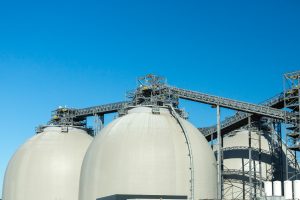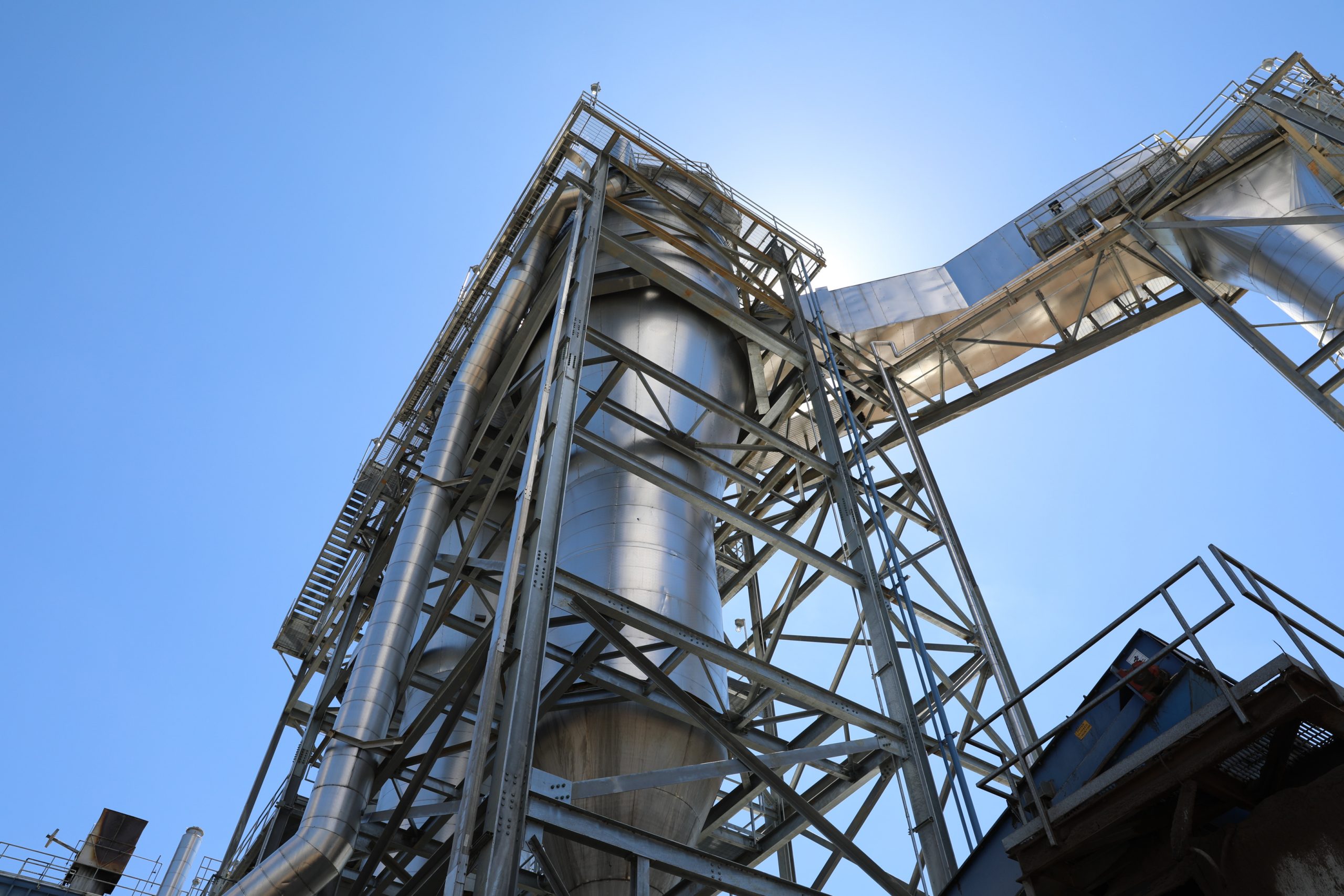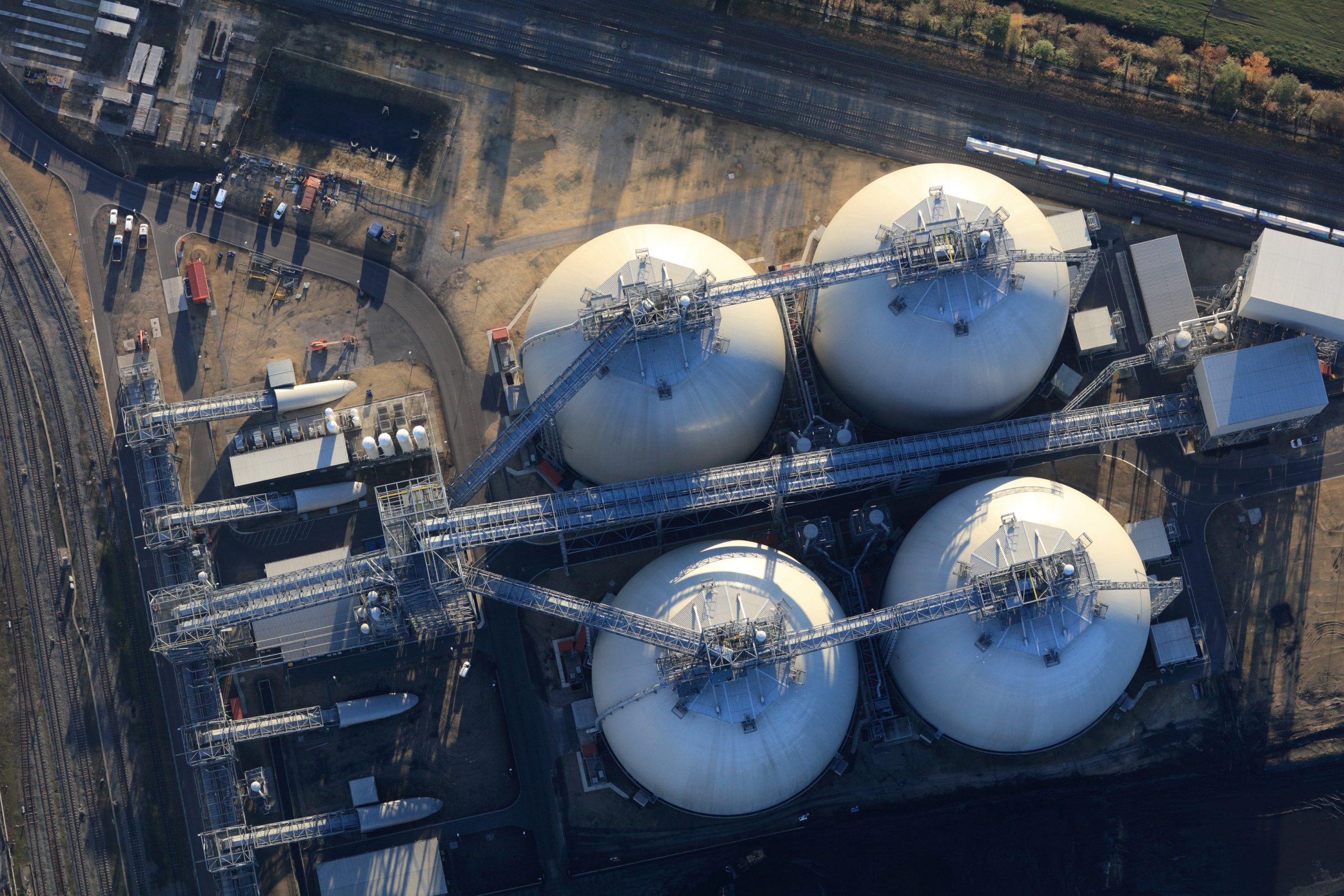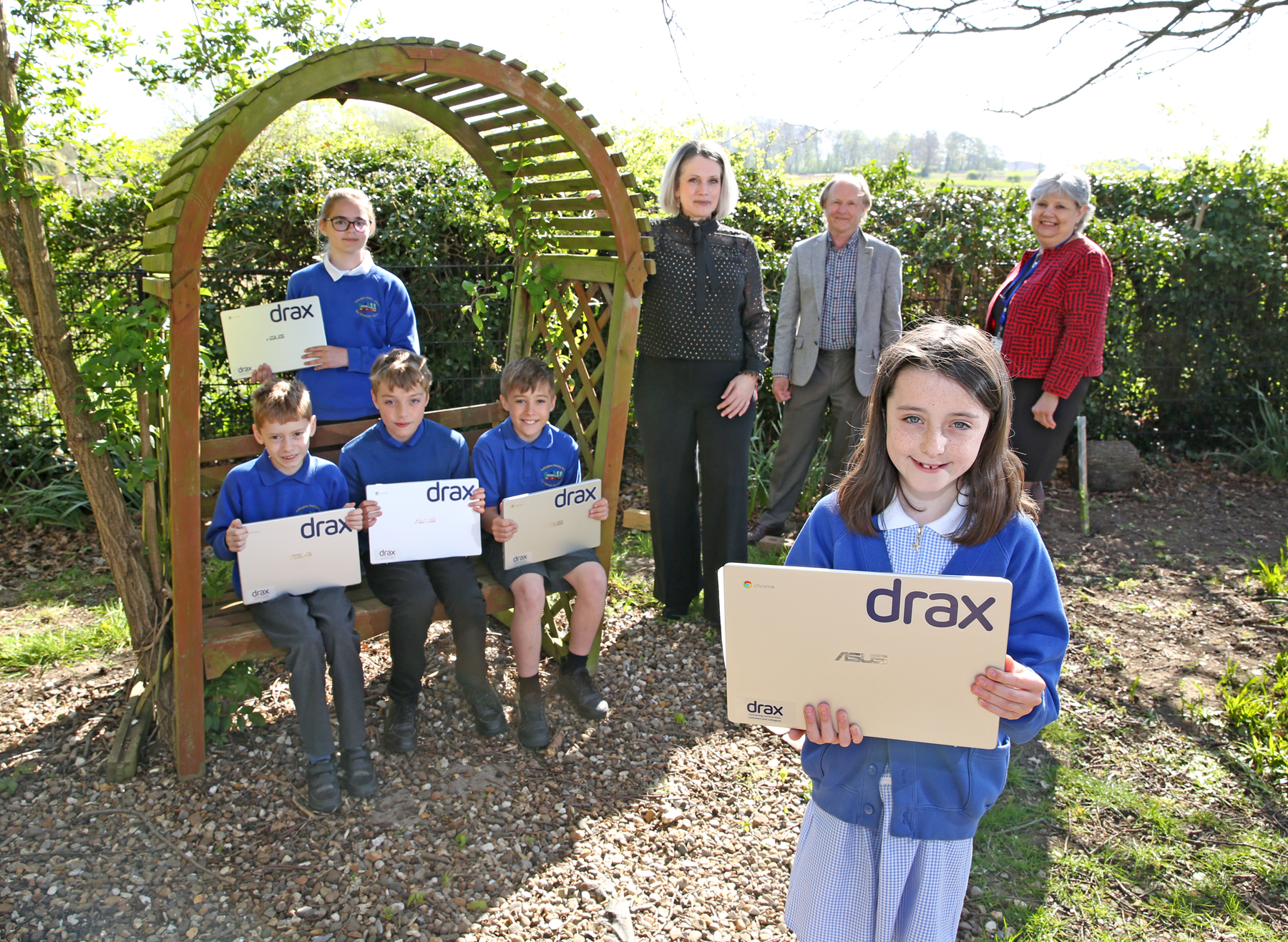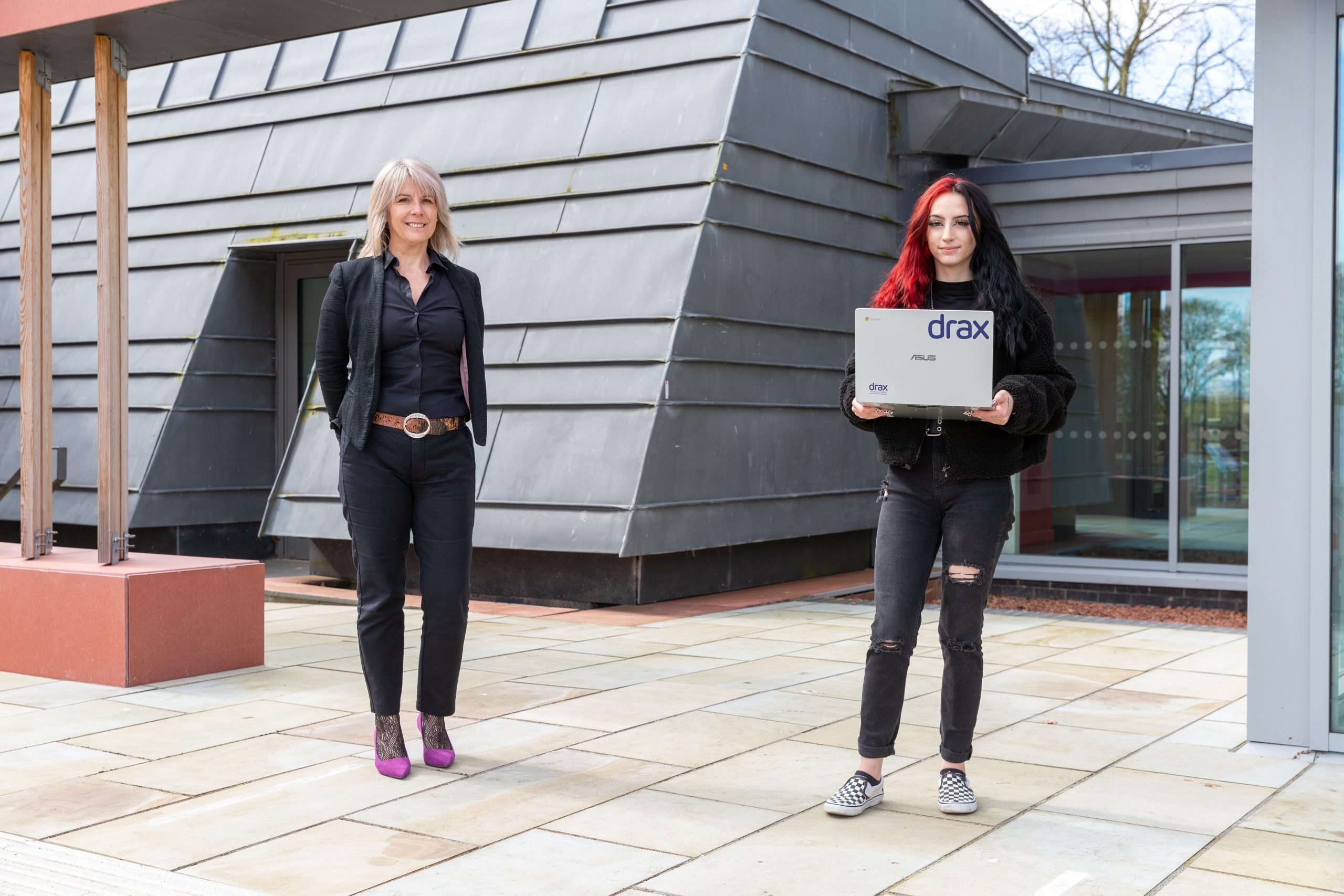
- Energy company Drax is delivering 320 more laptops with prepaid internet access to schools and colleges local to its operations across Britain, to ensure students whose learning has been affected by Covid lockdowns can catch-up.
- Three schools in Suffolk will receive 53 of the Drax laptops with pre-paid internet dongles – taking the total donated by Drax to schools in the county to 182.
- The latest donation means the total number of laptops provided by Drax, to more than 90 schools, to around 1,200, over the last 12 months.
Energy company Drax is furthering its commitment to supporting the education of children and young people local to its operations, by donating 53 more laptops to three schools across Suffolk, to ensure no child is left behind as a result of the Covid pandemic.
The donation is part of a national effort, which has seen the company donate over 1,200 laptops to 90 schools across Britain, to ensure no child is left behind as a result of school closures.
The £60,000 investment includes three months of pre-paid internet access via a 30GB dongle, to enable students to catch-up on missed learning following the re-opening of schools as the UK’s third lockdown comes to an end.
The laptops are being delivered to Drax’s partner schools local to its operations across Britain as part of the energy company’s efforts to support its communities as they recover from the ongoing effects of the Covid-19 pandemic. It follows the launch of Drax’s Mobilising a Million initiative, which aims to connect with one million people by 2025 to improve skills, education, employability and opportunity.
Will Gardiner, Drax Group CEO, said:
“We’ve given around 1,200 laptops to almost 100 schools since the Covid crisis started. Ensuring no child is left disadvantaged as a result of the pandemic is crucial if we are to avoid a lost generation of young people, by helping them to stay connected and catch-up on their learning.
“Drax has an important part to play in making sure we have a future workforce with the skills to deliver the new technologies needed to decarbonise the economy and meet the UK’s net zero target. We hope this donation will make a significant contribution to the UK’s green recovery from Covid.”
Member of Parliament for Central Suffolk and North Ipswich, Dr Dan Poulter, said:
“It’s fantastic that schools have re-opened and children are now returning to their classroom learning. However, for some, they will not have had access to the equipment needed to stay connected during the lockdown.
“For children and young people with limited access to a laptop and the internet, the pandemic may have had a significant impact on their learning. This generous donation by Drax will help remove barriers to learning.”
Helen Dickenson, Acting Vice-Principal from Thomas Wolsey Ormiston Academy in Ipswich, said:
“The donation of laptops and access to the internet from Drax will make a huge difference to our students. We are planning to use them to support any of our students who need to connect remotely with their education at any point in the future, as well using them in the classroom to support their ongoing education.”
Last year Drax donated more than 850 laptops to over 40 partner schools. This takes the total package of support Drax has provided to the communities in which it operates during the Covid crisis to almost three quarters of a million.
ENDS
Media contacts:
Ben Wicks
Media Manager
E: [email protected]
T: 07761525662
Megan Hopgood
Media Intern
E: [email protected]
T: 07936350175
Editor’s Notes
Drax has provided more than £750,000 in support to its communities and customers since the Covid pandemic started. This includes:
- £340,000 for 1,200 laptops, with three months of pre-paid internet access, to around 94 partner schools and colleges in communities local to Drax’s operations.
- Two months of free power worth £236,000 for 170 selected small care homes, local to Drax’s operations across England, Scotland & Wales, supplied by Drax’s B2B supply brands Haven Power and Opus Energy.
- £150,000 donation to the Money Advise Services’ Business Debtline to help SMEs facing financial hardship. The contribution supported the creation of a dedicated webpage and phoneline.
- $40,000 community donation to support food banks local to Drax’s operations in the US.
About Drax
Drax Group’s purpose is to enable a zero carbon, lower cost energy future and in 2019 announced a world-leading ambition to be carbon negative by 2030, using Bioenergy with Carbon Capture and Storage (BECCS) technology.
Its 3,400 employees operate across three principal areas of activity – electricity generation, electricity sales to business customers and compressed wood pellet production and supply to third parties.
Power generation:
Drax owns and operates a portfolio of renewable electricity generation assets in England and Scotland. The assets include the UK’s largest power station, based at Selby, North Yorkshire, which supplies five percent of the country’s electricity needs.
Having converted Drax Power Station to use sustainable biomass instead of coal it has become the UK’s biggest renewable power generator and the largest decarbonisation project in Europe. It is also where Drax is piloting the groundbreaking negative emissions technology BECCS within its CCUS (Carbon Capture Utilisation and Storage) Incubation Area.
Its pumped storage, hydro and energy from waste assets in Scotland include Cruachan Power Station – a flexible pumped storage facility within the hollowed-out mountain Ben Cruachan.
Pellet production and supply:
Drax owns and has interests in 17 pellet mills in the US South and Western Canada which have the capacity to manufacture 4.9 million tonnes of compressed wood pellets (biomass) a year. The pellets are produced using materials sourced from sustainably managed working forests and are supplied to third party customers in Europe and Asia for the generation of renewable power.
Drax’s pellet mills supply around 20% of the biomass used at its own power station in North Yorkshire, England to generate flexible, renewable power for the UK’s homes and businesses.
Customers:
Through its two B2B energy supply brands, Haven Power and Opus Energy, Drax supplies energy to 250,000 businesses across Britain.
For more information visit www.drax.com/uk




